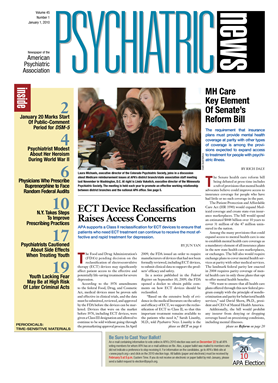Although research has found that 1 in 5 Americans will suffer from either depression or bipolar disorder in their lifetimes, there are an insufficient number of effective, evidence-based screening and treatment tools for physicians to use, and the ones that exist are poorly disseminated. The result is that the illnesses go undetected and untreated in half of the people who suffer from them, according to the Senate sponsor of legislation to help address the issue.
The bill would expand a national network of research centers focused on developing and expanding up to 30 “centers of excellence” to increase access to the most appropriate and evidence-based care for depression and bipolar disorder. The research facilities aim to reduce the nearly 21 percent lifetime prevalence of mood disorders among adults, as identified by the 2005 National Comorbidity Survey Replication.
The goal of the bill, dubbed the Enhanced Act (S 1857) and introduced last October by Sen. Debbie Stabenow (D-Mich.), is to better coordinate the work of the 16 existing university-based research centers that now independently study mental illnesses without federal support. The bill also would add funding for additional study centers to translate the latest findings into practice. Additionally, the centers' goals are to standardize diagnoses, spur earlier and more effective treatments, and prevent recurrences of depression and bipolar disorders.
“When government fails to support research and treatment, it stigmatizes depression and takes us backward to a time when those suffering with depression were told to stay silent,” said Sen. John Kerry (D-Mass.), who supports the bill.
APA Urges Passage
The bipartisan bill has drawn the support of leading mental health advocates, including APA. In a November 6, 2009, letter to Stabenow, Medical Director James H. Scully Jr., M.D., stressed that the federal support is needed because depression remains the second-leading cause of disability for individuals aged 15 to 44. In addition to the direct health costs, he cited research showing that untreated depression and “mood disorders” cost the United States $83 billion in lost economic output every year.
The bill's national research network “would help to improve the early diagnosis and effective treatment of these disorders, reduce cost to the health care system and businesses, and make a significant difference in the lives of millions of Americans each year,” Scully said.
The research centers also are expected to have a significant impact on specific patient populations. Research from the new centers could aid in the early identification of children with depressive disorders, for example, as well as the development of prevention strategies targeting children at risk, said Robert Hendren, D.O., president of the American Academy of Child and Adolescent Psychiatry, in a letter to members of Congress.
The impact of mental disorders on children is significant, he noted, with clinical depression affecting as many as 1 in 33 children and 1 in 8 teenagers nationally. Additionally, suicide—often related to untreated mental illness—is the leading cause of death among those aged 15 to 24.
“While many adolescents are diagnosed with a depressive disorder, most go undetected and untreated,” Hendren said. “Lack of detection leads to social and academic decline, may foster treatment resistance in children, and result in many future problems.”
Elderly Could Be Targeted
Another patient subgroup that the research centers could significantly impact is older Americans. About 5 million of the 32 million Americans aged 65 and older suffer from depression, “yet an astounding number go without treatment,” said Charles Reynolds III, M.D., president of the American Association for Geriatric Psychiatry, in a letter to Stabenow. The impact of untreated depression is seen in higher rates of hospitalization and almost twice as many medical visits as registered by older Americans without depression.
Untreated mental illness also is thought to drive the suicide rate among seniors, which is the highest among any age group. About 20 percent of U.S. suicide deaths are among people aged 65 and older. The suicide rate in the general population is 10.9 suicides per 100,000, while the rate among non-Hispanic white men aged 85 or older is 48 per 100,000, according to NIMH.
“The work of these centers will be an essential component in the dissemination and implementation of evidence-based practices in clinical settings throughout the country,” Reynolds stated.
Supporters hope to add the bill's language as an amendment to the health care reform legislation (HR 3590) now in the Senate. They have promoted the bill as a relatively low-cost way to achieve long-term cost savings for the health care system and the nation. Additionally, the bipartisan support by Senate leaders may improve the chances that such legislation would be added. The initial Senate supporters also included Sens. George Voinovich (R-Ohio), Sherrod Brown (D-Ohio), and Kay Bailey Hutchison (R-Tex.).
